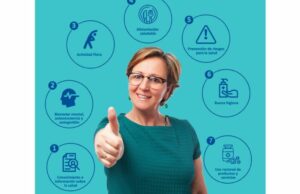Good health begins with small personal actions; however, the lack of knowledge or health literacy has allowed many myths to flourish and keep the population from enjoying good health.
The Central American and Caribbean Federation of Pharmaceutical Laboratories (Fedefarma) is aware that a more informed population in terms of health and that resorts to the responsible and conscious use of over-the-counter medicines is of great help in concentrating resources on the care of chronic conditions or in health emergencies such as that caused by Covid-19.
Sponsorship
In the United States, more than one-third of adults have below basic health literacy. In Europe, poor health literacy ranges from 29% to 62%; while in Latin American countries, only 17.6% of patients have adequate health literacy, according to the study “Adequate health literacy is associated with better health outcomes in people with type 2 diabetes.”
In turn, responsible self-care could reduce losses from work absenteeism of US$2 billion annually, according to the Latin American Association for Responsible Self-Care (ILAR).
An alternative for patients
According to Victoria Brenes, executive director of Fedefarma, self-care represents an alternative for patients to manage and take care of their health, reducing unnecessary visits to the doctor that involve missing work and potentially affecting their productivity and income.
“The practice of self-care is also a responsible action with the community, as it helps free up resources in health systems and allows that time and attention from doctors to be allocated to those who need it most,” Brenes said.

5 myths about responsible self-care
Self-care is a practice for prevention and health care:
TRUTH. Self-care defined by the WHO (World Health Organization) is related to a multidisciplinary approach to health care and disease prevention. Its seven pillars are: health literacy, self-knowledge and self-awareness of physical and mental health, physical activity, healthy eating, risk prevention (such as smoking or drinking alcohol), good hygiene habits and the rational use of services and health products, such as the conscious use of over-the-counter medications.
Self-medication is a dangerous practice:
MYTH. There are two concepts that are often used as synonyms, but they are quite different: self-medication and self-prescription. Responsible self-medication is a self-care strategy, and allows the patient to use over-the-counter medications to treat simple conditions. Self-prescription, on the other hand, is an irresponsible and dangerous practice, in which the patient uses medications that require a prescription or prescription on their own and without the supervision of a health professional. Over-the-counter medicines have been extensively tested, and then approved by regulatory authorities so that they can be purchased and used by people without the need for a prescription, due to their proven safety and effectiveness.
You should not take medication without first always consulting a doctor:
MYTH. Over-the-counter medications do not require a prescription or prescription. A patient with a mild symptom, such as a headache, back pain, or diarrhea, can purchase these drugs from a pharmacy or licensed store without a doctor’s prescription. If you need guidance, you can consult the pharmacist. Consulting a health professional helps you to have the correct and necessary information to take care of yourself and avoid unnecessary visits to the doctor.
Patients should take precautions when taking over-the-counter medications: TRUTH. These medications are safe and effective, they are authorized and recommended for specific conditions considered mild indicated on the packaging or labels. However, they must be used responsibly and conscientiously. Having the support of a health professional, such as a pharmacist, helps resolve doubts regarding the use, benefits and possible adverse effects of over-the-counter medications. Part of its role is to inform about the form of administration (dosage), the duration of treatment, the mode of action of the medication, and possible adverse reactions, contraindications and interactions with other medications or foods.
Over-the-counter drugs are not effective:
MYTH. The fact that they do not require a prescription does not make them less effective. On the contrary, it is precisely because of their proven effectiveness and safety that they have been approved for free sale. These are medicines that have passed all the tests that any medicine requires, in addition to having been approved to be administered safely without a prescription.


